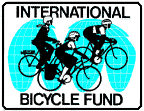Poland's Bicycle Planning Policy
WE WOULD LOVE
YOUR SUPPORT!
Our content is
provided free
as
a public service!
![]() IBF is 100%
IBF is 100%
solar powered
![]()
New Polish Traffic Law Favors Cyclists
By Marcin Hyla, Project Coordinator, "Cities for Bicycles"
The Polish Parliament approved a national traffic code that improves conditions for cycling. Cyclists now have the right of way when on a cycleway crossing a subordinate street and cycling is allowed on sidewalks if road speed limits exceed 50 km/h. Other changes include a ban on the use of hand-held mobile phone cars. Proponents hoped for a new speed limit in cities to be 50 km/h, but the majority voted to keep the old 60 km/h limit.
What seems to be the greatest victory is that bicycles (apart from the mobile phone and speed questions) became the national issue and this will undoubtedly help in future pro-bicycle policies.
The changes were advocated by the Cities for Bicycles (CfB) network and by an opposition party Unia Wolnosci (Union for Freedom), whose MP's staged a bicycle action in front of the Parliament in mid-April, 1997. The fact that other MP's joined environmentalists and supported bicycles is noteworthy.
Poland has a mixed record on cycling. In small towns it is quite popular. In larger cities, cycling rates are low and car ownership now exceeds 300 per 1000 pop. In all of Poland, there are only 200 kms of cycleways and very little official support for cycling. Except for a few locals (Wroclaw, Cracow and some lesser towns), there is no policy promoting cycle use.
Certainly, the new laws will help to promote more cycling. Unfortunately, this is the only nationwide change. The national transport policy -- now being revised -- seems to be anti-environment and is not interested in urban traffic.
Traffic in Poland has changed dramatically since the fall of communism in 1989. Car use and ownership is rising sharply -- at least 10% annually. New car sales rose by 40% between 1995 and 1996. This leads to congestion and environmental problems. Warsaw has about 400 cars per 1000 inhabitants. Motor traffic has become the most significant source of air and noise pollution. It producing some 50-80% of the air pollution
During communist rule, cycling in larger cities in Poland was almost unknown, partly due to very cheap public transit and partly to the lack of bicycles. On the other hand, it was popular in small cities and villages - which may actually have a negative impact on the image of cycling, ascribing it a low status.
However, in the last few years there has been an enormous increase in cycling: Mountain bikes are very popular and more people are trying city bikes. There are local grassroots environmental groups, trying to promote cycling and lobbing for cycling facilities. And a few local governments are involved: Cracow is the only Polish member of Car Free Cities network . Wroclaw has the largest cycleway network (25 kms). Each larger city seems to have some sort of cycling plans (I would not call them policies). The most advanced is Wroclaw, which is scheduled to build 100 kms before 2000. In Cracow, widely recognized as the leading cycling city in Poland, cycling was 2% of the non-pedestrian trips in 1994, in 1997 it may exceed 3-4%. It has an official cycling policy aiming at a 350 kms network and traffic calming, but implementation is slow.
In autumn of 1995, groups (mostly Green Federation groups) formed the CfB network, coordinated by the Fundacja Wspierania Inicjatyw Ekologicznych (Foundation for the Support of Ecological Initiatives) in Cracow. There are now groups in about 20 cities, including Warsaw, Gdansk, Poznan, Wroclaw and Lodz. On June 2nd, 1996, these groups staged national No Car Day with 500 cyclists demonstrating in Warsaw and Cracow and lesser events in 20 other cities. This action was followed by lobbying on both local and national levels.
The CfB is a network of local organizations and individuals. Its goal is to promote urban cycling through public education and lobbying. It’s not (as yet) an organization. CfB cooperates with the Polish Ecological Club and with local cycling clubs - though their scope is mostly sport and leisure. It has published a book "Cities for Bicycles, not for Cars" (FWIE, 1995), a poster and badges. It collects data on cycling and organizes cycling events. The project is funded by the Dutch foundation Stichting Doen.
Further information: Cities for Bicycles, c/o FWIE (Fundacja Wspierania Inicjatyw Ekologicznych), (Foundation for the Support of Ecological Initiatives), ul. Slawkowska 12, 31-014 Krakow Poland. Tel: +48-12-222264. Fax: +48-12-222147. Email: zarzad@fwie.eco.pl
Copyright © 1996 International Bicycle Fund. All rights reserved.
Home | About Us | Contact Us | Contributions | Economics | Education | Encouragement | Engineering | Environment | Bibliography | Essay Contest | Ibike Tours | Library | Links | Site Map | Search
![]()
The International Bicycle Fund is an independent, non-profit organization. Its primary purpose is to promote bicycle transportation. Most IBF projects and activities fall into one of four categories: planning and engineering, safety education, economic development assistance and promoting international understanding. IBF's objective is to create a sustainable, people-friendly environment by creating opportunities of the highest practicable quality for bicycle transportation. IBF is funded by private donation. Contributions are always welcome and are U.S. tax-deductible to the extent allowed by law.
![]()
![]() Please write if you have questions, comment, criticism, praise or
additional information for us, to report bad links, or if you would like to be
added to IBF's mailing list. (Also let us know how you found this site.)
Please write if you have questions, comment, criticism, praise or
additional information for us, to report bad links, or if you would like to be
added to IBF's mailing list. (Also let us know how you found this site.)


